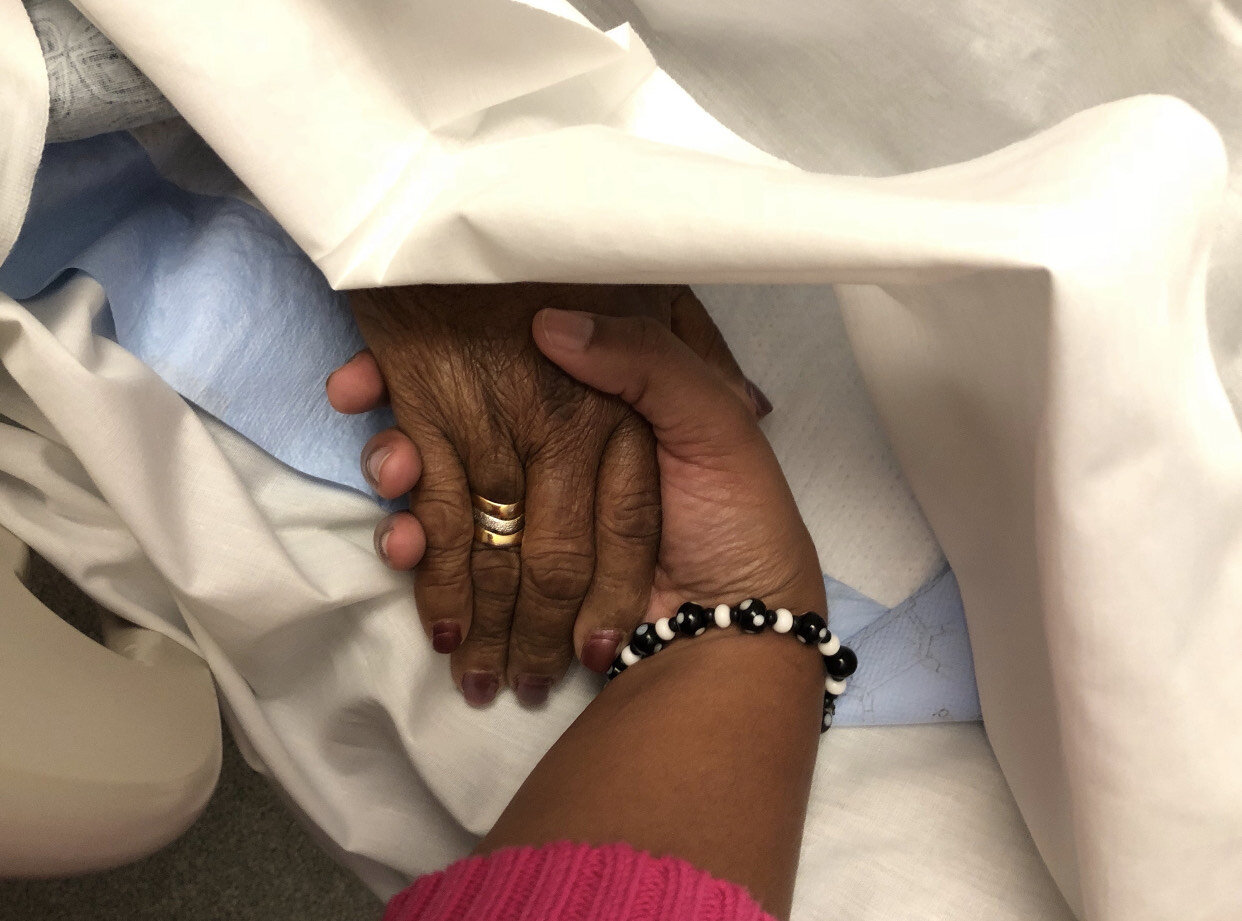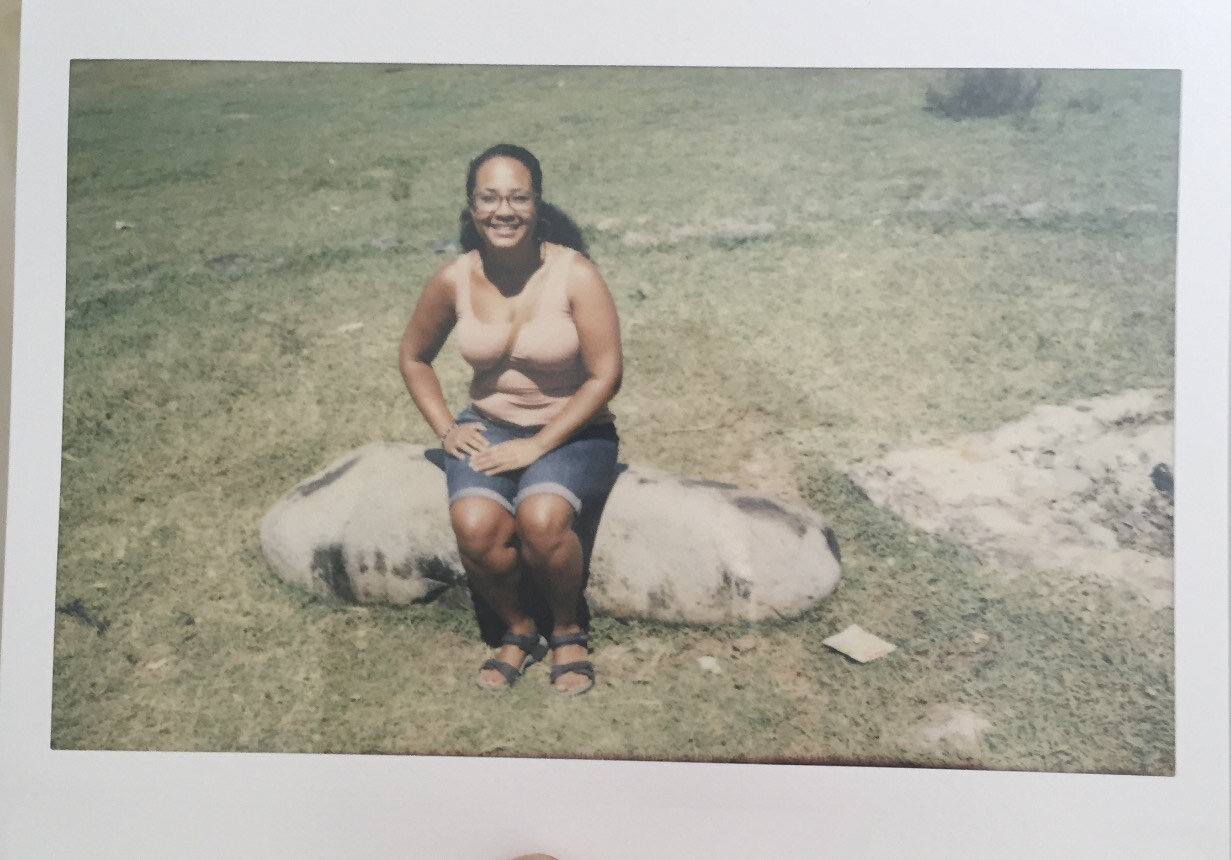A Caregiver’s Burden
Para leer esta historia en español haz clic aquí.
I cannot see her on life support again.
It feels like I am on autopilot when I reach into my bag for the mentholated camphor spray. I snuck into Abuela's secret room to find it. In every home she has lived in she has always made space for a room where she keeps her votive candles, cups filled with water, candy dishes, and jars of palm oil and nectar. Her altars.
I spray two spritzes of camphor. Immediately, the air is filled with comfort—the woodsy minty scent awakens the air.
I run a washcloth under room temperature water and begin slowly to cool down her face and neck. I know she feels relief when her crying has subsided. I take a moment to lower the temperature of the water hoping somehow her body will take cues. I fold the washcloth on her forehead partially covering her eyes in a desperate plea to coax her into an afternoon nap.
There is music playing in my head.
This is almost routine now. I open the long sponge Q-tip and dunk it in ice water and use the sponge to wet the insides of her mouth as she tries desperately to drink any moisture she can from the sponge.
She is dehydrated and the thickening solution added to her drinks has already caused one too many incidents—plus, this woman loves to pull out her feeding tube in her sleep.
“Yo soy Ogún Balenyó
Y vengo de Los Olivos
a darle la mano al enfermo
y a levantar los caidos
Ay yo soy Ogún
Balenyó
Y vengo de allá
Balenyó
Ay Papá Candelo
Ay Papá Legbá
Anaísa Pie
Ay Belié Belcán?”
The chanting is coming from my mouth, I’m not sure when or how but I’ve begun to sing a worship song I haven't heard her sing since I was a young kid. Decades.
I begin to notice my singing is the only noise in the room. It’s working, her crying has lulled.
At this moment, I wish my mother would run to comfort me. I wish she would tell me everything will turn out okay. Somehow I have become the caregiver for both of them, my mother and my grandmother.
I always wait until Abuela is asleep before I leave her bedside. I grab her hand and kiss her goodnight. I sing the songs she always sang to me before I went to sleep as a young child. I remix them and add some new slang trying to lift her spirits while hiding my fears that she will not be here when I return the next day. Mami always gives me a ride home on the days she visits with me, sometimes I assume it's too much for her to see her mother so close to death. Sometimes Mami takes days off.
It’s 1995 and Mami spends her nights and weekends working a second job and completing her GED to secure a better future for our family. As would become customary, I’m spending my free time with Abuela. Some girls get to be Daddy’s girls, I got to be Abuela’s girl.
Tonight, we’re heading from Dorchester to Charlestown. The ride in the car is long, there is traffic, and I’m sweating under my winter coat and the heat is turned full blast but the music is too loud for the adults to hear my protest. The driver let us know we’re almost there, as he takes a sharp turn down Bunker Hill Street, bright red brick buildings appear looming giants. Suddenly we’re surrounded by them. They all look identical if not by the white numbers identifying the doors where residents live.
Abuela gets out the front signaling this is our stop, I exit right behind her. The two of us follow the sound of the music, there must be a party.
We walk inside and everyone seems to move out of the way to one side or the other. There is loud music, chatter and several people screaming:
“¡YA LLEGÓ! ¡YA ELLA LLEGÓ!”
“Welcome!” There’s a woman who greets us at the door. She looks kind, around my mother’s age. I wonder if there are more kids here I can play with.
She takes our coats and places them on a wooden coat rack behind us.
Abuela hands me her purse. This is my job, the most important job I have, at the ripe age of six—I’m the purse holder! I make sure nothing happens to it, which means it never leaves my sight and it never touches the floor.
The woman who lives in this apartment offers to take me back to her bedroom so I can watch TV.
“If you like, I can set her up in my room, no one’s back there, she can watch TV.”
“Absolutely not, she is fine here with me.” Abuela was firm, her voice still sweet. We both know what happens to little girls left unattended behind closed doors.
I sat down in a corner chair and an elderly woman offered me dinner, cake, and every soft drink I could dream of. I was as polite as possible, always asking for grape soda. It would be years before it dawned on me that we were the guests of honor, that all those people were waiting for us to arrive. Those women were making sure my grandmother, and by extension I was also well taken care of during those gatherings.
I study Abuela in the corner of my eye while sipping out of a styrofoam cup and swaying my legs back and forth on a plastic chair. She swiftly pulls out her ceremonial headscarf, adorned her head, and shape shifts into the healer folks called upon for miles. She lit one of the candles on the already overflowing altar in the corner of the room. Overflowing with fruit baskets and offerings of floral arrangements, and jars filled with honey nectar.
Abuela transforms herself as she lights her cigar on a flame from a match box before joining the crowd as they sing in prayer. I watch Damaris the Curandera, the spiritual healer who learned the Afro-Indigenous traditions that survived the transatlantic slave trade and were passed down to her by her godmother. Over the years, I carried her purse, I studied her transformations, and waited patiently by her side while she delivered spiritual healing to the broken, ailing, and ill throughout our Dominican-American community.
*
Two years before Abuela gets sick I have this pain in my soul. I can't describe it with words that exist in the English language, but it feels like there’s a magnetic force field shifting and I just know I am in the wrong place. I sublet my apartment in Boston, I pick up an extra part-time job, I fundraise, and leave my salaried full-time job with benefits.
At 26 years old, this is my first apartment living alone. It’s a tiny studio apartment in San Juan de la Maguana, a rural mountain side village in western República Dominicana where I’m working for six months. I visit my extended family when I get the chance, even though it takes four hours on the bus. In the mornings I make myself coffee in my greca and enjoy a lukewarm shower as the sun shining onto the tinaco provides some warmth. Everyone here on the island looks like me, no one ever mispronounces my name like they do back in Boston. This feels like home.
I grab lunch before I head to my part-time job, sometimes it’s a couple of pastelitos de huevos, sometimes I make myself avena.
My favorite place to grab lunch is la casa verde. There is no name for this restaurant, just la doña who cooks whatever is on the menu for the day. It’s known as la casa verde en la 27 de febrero and once she sells out, she’s closed for the day. I love when she makes guandules. I shop at the farmer’s market for produce on Mondays and on Wednesdays I go to karaoke at Movie Bar. On Thursdays, there is a live band that performs perico ripiao at Hotel Magua, I dance every chance I get.
On weekends, I explore as far as my legs and wallet will let me.
I take a day-long trek with an 18-year-old guandules farmer to El Salto de Los Ingenitos, an eight-mile hike with no trail. I travel to pebble beaches where rivers meet the ocean, Bahia de Las Águilas—a rare slice of the island preserved without hotels, resorts or tourist attractions. Along the way, I make friends and we hang out at the colmado, drink Brugal in el río Yaque. We eat fried fish and tostones and chenchen con chivo. One Friday afternoon, Amaurys drives us over to the Corral de Los Indios just 3 miles away from my apartment. We walk over to what looks like an arrangement of boulders.
“This is a historical meeting place for the natives of the island. You’re standing right next to the same rock Anacaona sat on.” Amaury explains.
This is what I came here for. This is the happiest I’ve ever been, I feel free.
I mostly remember feeling the itchy wool around my neck. I can't recall the time of day—it's still dark outside, in New England, it could be morning or after work.
We’re standing at the front door of our one-bedroom apartment in Lynn. I’m barely four years old, I know which apartment by the furniture, this place had a leather chair by the front door. It was a 45-minute drive to and from her job in Boston everyday, but it was the place she could afford at the time. I know we sometimes spent nights at Abuela’s house but with the drug dealing downstairs and the violence increasing—Mami had decided to move out. My mom tried her best to bring us home at night, to the place we called home.
I’m uncomfortable as the wool grates against my skin, I have my gloves on as she is zipping up my winter coat careful not to catch my curly hair. I glance at Mami, catching a look at my dirty black boots splattered by the salt residue evidence there was snow outside.
“Mami is on a new medicine, If I pass out just pick up the phone and you dial 911, okay?” I can hear her voice clearly as crisp as the air. A direct order, zipped jacket all the way to the top. I’m sweating under all the layers.
I nod my head before the words escape my mouth “Yes, Ma.”
She puts my hat on my favorite winter hat, as if donning the final piece of my armor. We’re ready to leave.
This is my oldest memory.
*
It's February 2019, I’m 28 years old and I’m wondering how I got here. How did I become the bearer of bad news?
Standing in a nook I found myself in the hallway on the fifth floor of the Brigham and Women’s Hospital, I pull out my cell phone and let out a deep sigh. I start by calling my aunt Jackie in Maryland who is the oldest of the clan. I call my mother who is brief—she isn't a morning person.
I call Abuela's youngest child next.
“Hey Genaro.” My uncle is just ten years older than me so growing up he just seemed like more of a big brother.
“What’s up my RenRen?” It swells my heart. I know he’s taking this call from Abuela’s living room, sitting on her couch awaiting news on her return. He begins to sob when I ask for his consent to intubate his mother. I feel his fear transmitting through the frequencies between us. I make sure to breathe hope into the receiver before I press end.
I shake off this feeling of dread and call my aunt Claribel. My abuela’s youngest daughter who diverted my Friday morning routine to work.
“Hi titi, her lungs are filling quickly with blood. We can either intubate and try life support for a few days or they can make her comfortable until she passes.”
“Yeah, that is the report I got from her doctor. What did everyone else decide?”
“Unanimously life support.”
“Okay.”
Suddenly she’s gone. Dominicans are notorious for hanging up the phone without saying goodbye.
*
I take a sharp turn around the sanitized walls of the hospital and enter the small room my 69-year-old grandmother was admitted to earlier this week. She’s alert.
“No puedo respirar...
Me voy a morir...
Me voy a morir...”
She is crying, pleading for her life. I have never seen her cry before.
“Abuela, tú no te vas a morir. Los médicos te van a cuidar y yo estoy aquí contigo.” I hold her hand as I translate exactly what the doctor is explaining to me. There is no time to wait for a medical interpreter now, we’re fighting against the clock.
“Tus pulmones no están funcionando. Vamos a bajar para el salon de cirugía, te van a dormir y intubar. Tú eres dura, nos vemos en un par de días—te adoro.”
“Yo te adoro mi corazon”
I squeeze her hand tight hoping to be of comfort.
“¿Y mi caltera?”
“Aquí la tengo.” I clutch onto her purse and personal belongings as they quickly wheel her hospital bed into the steel elevator down to the operating floor. Somehow in the haze all of the commotion is gone and it is just the two of us and the operating room nurse. I explain to her one more time what the procedure will be like, I tell her not to be scared, that I will be there when she wakes up.
“I love you.”
“I love you too,” she returns in the tattered English she's learned after 40 years of being in the United States. I would have it no other way.
“I love you more,” I whisper, hugging her purse. I watch the distance grow as they wheel her past the do not enter signs, not knowing how long it would be before she came home again, before we would be whole again.
*
It’s spring now and these dreary off-white walls have become entirely all too familiar. The Brigham and Women’s Hospital has been my new home the last four months. The smell of antibacterial soap is somehow comforting as it wafts through the hallways. I know what kind of day we’re having by the decibels her screaming is reaching in her delirium. Sepsis had taken over her body, although my grandmother was valiantly fighting the infection, her mind was elsewhere. On the worst days, she can be heard from the elevator. Screaming in agony. “Mamá! Mamá!” She is asking to be comforted by her mother—or so I believed for the first week before Mami informs me over dinner in the cafeteria that my Abuela was actually raised by her godmother. Her wailing isn’t for the woman I know as Mamá, I never got the chance to meet her.
We are a family of wounded women. Seeking comfort from our mothers when we need it most, knowing they will not come. I walk faster, knowing the delirium has stepped up. Doctor’s discovered my grandmother developed MSSA staph bacteria, she has a fever and the infection is taking over.
*
Every morning after my trip I wake up with regret that I ever bought a return flight to Boston. I was too scared to leave the nest for too long. Too scared someone might need my help. Too scared something bad might happen. I spent four months at Abuela’s bedside while she recovered. Thankfully she was able to come home. It confused me for years why I was called that morning to be with Abuela when she has three adult children before I realized what they saw in me. I had the most experience. With Mami being sick most of my life, they figured I could handle it and that I would do the best job. For them, I was the adultiest-adult in this situation.
After being isolated and quarantined with Mami while waiting for the Covid-19 vaccine, I’m folding laundry when I have an epiphany. My 20-something-year-old younger sister left quarantine months ago. “I love you all but I can’t stay locked inside anymore.” That’s when I realized exactly what it’s felt like for decades: tense, anxious, and trying to stay in control—just like the pandemic. Being a caregiver, I learned really young how to anticipate others' needs. But tending to all of our wounds simultaneously, did any of them heal?
Renata Caines is a black queer Dominican American from Boston. she is a community organizer and educator, inspired by the power of the people. she is now owner and chief engagement officer of the Boston Garden Dispensary, rooting equity and restorative justice into cannabis in the Commonwealth.
Renata Caines graduated from Northeastern university with a degree in Sociology and Social Movements.






